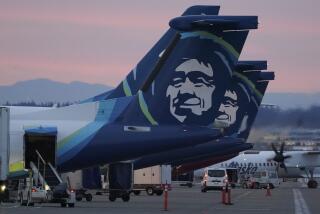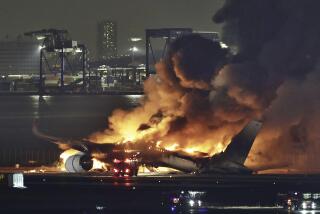Bomb Blast Kills 4 on TWA Flight : Jet Lands in Athens After Apparent Terrorist Act Rips Hole in Fuselage
- Share via
ATHENS — An apparent terrorist bomb exploded aboard a Trans World Airlines jetliner 15,000 feet over Greece on Wednesday, blowing out four passengers to their deaths, but the pilot safely landed the crippled plane here just minutes later.
The unidentified explosive device, which TWA officials said went off in the passenger cabin at about floor level, tore a 10-foot-square hole in the fuselage in front of a wing as the Boeing 727, with 121 people aboard, was preparing to land at Athens’ Hellenikon International Airport at the end of a flight from Rome.
Nine passengers were injured, but only three of those remained hospitalized today.
A Greek government spokesman called the bombing “a barbarous terrorist action.”
All the dead apparently were American citizens. According to Greek officials, the airline and relatives, the fatalities were Alberto Ospina, a Colombian-born American from Stratford, Conn., and three members of a Greek-American family-- Dimitra Stylian, 52; her daughter, Maria Klug, 25, and her 3-month-old grandchild, all from Annapolis, Md.
In Beirut, a little-known Palestinian guerrilla group called the Arab Revolutionary Cells claimed responsibility for the bombing.
An anonymous telephone caller, speaking in Palestinian-accented Arabic, said the Ezzedine Kassam Unit of the Arab Revolutionary Cells planted the bomb aboard Flight 840 in retaliation for last week’s U.S. military confrontation with Libya in the Gulf of Sidra.
But in Tripoli, Libya, Col. Moammar Kadafi quickly distanced himself from the bombing, saying, “This is an act of terrorism against a civilian target, and I am totally against this,” CBS Television reported.
Greek police said three bodies were found on an unused Greek air force landing strip outside Argos, 120 miles southwest of Athens, and the fourth was in the sea nearby.
An official at Athens airport said a shepherd near the village of Statheika, two miles northwest of Argos, saw bodies and at least one of the plane’s seats falling and directed rescue workers to the site.
The official said the explosion occurred on the starboard side of the aircraft as the pilot, Capt. Richard D. Peterson of Sarasota, Fla., was descending for his final approach to Athens.
People ‘Just Disappear’
“The people in Row 14 saw some people sitting in front of them just disappear,” the airport official said.
Sarah Tittle, 24, of New York, who was near the ill-fated passengers when the explosion occurred, said, “I was just sitting there when a piece of flesh landed in my lap.”
Yiannis Kapsis, a Greek undersecretary for foreign affairs, said, “The blast was caused by an explosive device in a piece of luggage aboard the plane.”
Italian Defense Minister Giovanni Spadolini said, “The shadow of terror is spreading over the Mediterranean.”
Asked if the bomb could have been planted aboard the plane in Rome before it left for Athens, Spadolini said: “That is one of the theories.”
In Washington, a State Department spokesman would say little about the incident. “Preliminary information now indicates that the explosion was caused by some type of a bomb,” department spokesman Pete Martinez said. “We cannot confirm any additional details at this time. The investigation is continuing. We have seen the press report which said a little known group called the Arab Revolutionary Cells claimed responsibility. We are looking into it.”
Changed Planes
Flight 840 originated on a Boeing 747 in Los Angeles on Tuesday morning and stopped in New York before proceeding to Rome, a TWA agent said. Retaining the same number, the flight changed to a Boeing 727 in Rome for the next legs to Athens and Cairo.
Most of the passengers--103--began the flight in the United States. Transferring to the smaller plane in Rome, they were joined there by 11 more, the airline said. The 727 had a crew of seven.
At a news conference in New York, Richard D. Pearson, president and chief operating officer of TWA, said Capt. Peterson told him there had been a “jarring” explosion at 15,000 feet, about 15 minutes short of Athens.
The explosion occurred in Row 10 near the floor level, Pearson said, and blew a hole in the fuselage about 10 feet square. The blast was apparently at Seat 10F, which on a 727 is at a window just forward of the starboard wing.
Passengers Used Masks
Oxygen masks dropped from overhead compartments, and passenger used them to facilitate breathing as debris from the explosion filled the cabin, he said.
Three airline personnel including a captain--who were “dead-heading,” or between flight assignments--were aboard the plane. They assisted the crew in aiding injured passengers.
After the explosion, Peterson had to increase power to overcome additional wind drag, Pearson said, but he quoted the pilot as saying the emergency landing at Athens was “otherwise uneventful.”
There was “no panic,” he said. “There was decompression that occurred, though the plane was down to 15,000 feet. There were a lot of fragments flying around in the airplane. The main difficulty would be . . . breathing with the fragments flying around. The pilot did deploy the oxygen masks, and people used the oxygen masks, and by the time they had them on, the airplane was cleared for an approach and made a normal approach--a very controlled, very unpanicked kind of situation.”
Speaking before the obscure Palestinian guerrilla group claimed responsibility for the bomb, Pearson said he did not believe that TWA’s labor difficulties--its flight attendants are on strike--had anything to do with the bombing.
Serviced in Rome
The flight is fully serviced in Rome, Pearson said. He would not describe the precise security measures used at the Rome airport, nor would he speculate on how the bomb was placed on board.
In response to a question, Pearson said TWA has no plans to suspend service to Europe.
Authorities at Rome’s Leonardo da Vinci airport said that none of the checked baggage of the 103 passengers who boarded the flight in Los Angeles or New York was X-rayed or examined in Rome before being shifted to the smaller 727 but that all the luggage of the 11 passengers who boarded in Rome was X-rayed. In addition, the airport authorities said, some air freight was moved to the ill-fated plane from the jumbo jet, and some American military mail was also added in Rome.
All the passengers in Row 10 boarded in the United States, TWA said.
The Greek government has invited both the U.S. Federal Aviation Administration and the FBI to join in the investigation, according to Western diplomats in Athens. They said the cockpit flight recorder of the plane will probably be sent to Washington for analysis today.
Fear Retaliation
Diplomats of some Mediterranean countries expressed fear that the United States might take military action against whoever might be presumed responsible. Recalling the U.S. Navy’s military encounter with Libyan forces in the Gulf of Sidra last week, they noted that Washington has accused Libyan leader Kadafi of supporting terrorism.
The fear was diplomatically voiced by Italy’s Defense Minister Spadolini, who said, “I hope the Americans will focus the problem in its political framework, which requires solidarity and policy agreement rather than instruments of military action, which are always inadequate compared to the rapidity and insidiousness of terrorist attacks.”
Among the injured who remained hospitalized at Asklipion Hospital near the airport Thursday was a Los Angeles resident, Myrtle Siemsen, 67. Her husband, retired army Col. Henry Siemsen, 70, was also injured but was released after treatment. Ibrahim Anani, 23, of Saudi Arabia, and his wife, Nala, 20, also were hospitalized with fractures, according to hospital sources.
Hit by Glass Fragments
“It sounded like there was an explosion right outside the window,” said Myrtle Siemsen, who was being treated for cuts. “I was hit by dozens of fragments of flying glass. No one felt safe until the plane finally landed.”
Anani described the incident, saying, “There was a big bang and then the man beside me was blown out along with his seat. I felt myself being pulled out too and I hung on to my wife’s seat beside me.”
Others slightly hurt in the blast aboard the plane but released after hospital examinations included American James Carlton Denon, 29, hometown unknown, and three Greek citizens, according to police sources. The ninth injured person was not immediately identified.
One of the passengers, a 36-year-old Salem, Ore., woman, said she was sitting in Row 8 when the explosion occurred. “The bottom of the seat behind me was blown up, but the back was still there,” said Janet Chaffee. “There was a hole in the side of the plane through which you could look out. The captain did not announce anything. The stewardesses tried to calm us down. There were two men speaking Arabic in front of me. I heard them say, ‘Inshallah. ‘ (God willing.)”
Cora Shintaku, a Japanese-American on the plane, said, “No one thought it was a bomb until we got off the plane. It just sounded like a hissing, real strong. I thought, they can’t have done any maintenance work.”
Florentia Haniotakis, a Greek-American from Ohio traveling with her two small children, said she was sitting next to the spot where the explosion occurred but was saved because she had gone to the lavatory just before the blast occurred.
Police sources said they had questioned five Arabs, including two with Lebanese passports, among the passengers, but stressed that they were not “interrogating” them.
A Los Angeles woman who said she has flown to Athens in the past summed up the feeling of many of the passengers. “No more travel for the time being,” said Janet Clinger, 32, as she was hurried past reporters.
Times staff writer Bob Dallos in New York also contributed to this story.
Other stories and photos on Pages 28, 29, 30 and 31.
More to Read
Sign up for Essential California
The most important California stories and recommendations in your inbox every morning.
You may occasionally receive promotional content from the Los Angeles Times.













